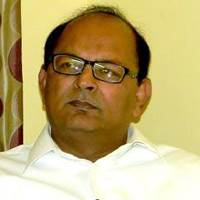Profile of Shariq Kaifi
Real Name : Syed Shariq Hussain
Born : 01 Jun 1961 | Bareilly, Uttar pradesh
Relatives : Kaifi Wijdani (Father)
raat thī jab tumhārā shahr aayā
phir bhī khiḌkī to maiñ ne khol hī lī
raat thi jab tumhaara shahr aaya
phir bhi khiDki to main ne khol hi li
Shariq Kaifi (Syed Shariq Hussain) was born on June 1, 1961, in Bareilly, Uttar Pradesh, where he completed his B.Sc. and M.A. (Urdu).
His father, Kaifi Wijdani (Syed Rafaaqat Hussain), was a renowned poet, passing down the legacy of poetry to him. His first collection of Gazals, “Aam Sa Rad-e-Amal”, was published in 1989, followed by a second ghazal collection, “Yahan Tak Roshni Aati Kahan Thi”, in 2008, and a collection of Nazms titled “Apne Tamaashe Ka Ticket” in 2010. Shariq Kaifi currently resides in Bareilly.
Shariq Kaifi’s poetry, both in Gazals and Nazms, stands apart from conventional poetry. His tone, thought, narrative, and technique make him unique among his contemporaries. His Nazms brilliantly encapsulate social realities through what one could call a “fourth eye”. To truly understand this perspective, one must read his work carefully and reflect on it.
Shariq Kaifi’s poetry reflects the present era—a clean, unadorned form free from cheap embellishments. It may appear straightforward and transparent, but it carries deep meaning, directly addressing human relationships. It touches, soothes, and acknowledges themes such as the respect, complexity, and fragmentation of relationships. Tackling themes of love, friendship, betrayal, hostility, denial, and acceptance, his poetry strikes powerful blows on social attitudes with a skill that leaves a lasting mark, even as those affected struggle to find the source of the impact.

